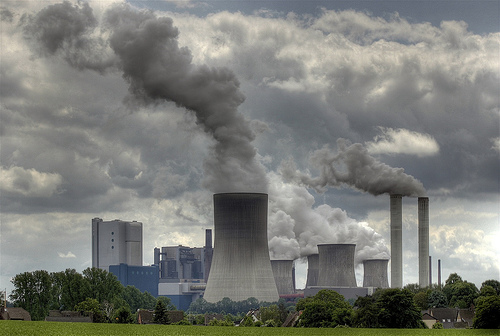
Photo by davipt, <a href="http://www.flickr.com/photos/davipt/164341428/">via Flickr</a>.
Health groups are raising concerns about a provision buried in the 987-page American Power Act unveiled yesterday that they believe might undermine existing clean-air standards.
On page 182 of the bill from Sens. John Kerry (D-Mass.) and Joe Lieberman (I-Conn.), the administrator of the Environmental Protection Agency is directed to “establish a task force” that would examine “existing programs” at the state and local level to curb pollutants from power plants. The task force would look at “the effect the programs may have on the pace and extent of the transition of the existing coal-fueled power plants to significantly lower greenhouse gas emitting technologies or the retirement of existing coal-fueled power plants in the fleet.”
The task force is also given the authority to review federal regulations “currently under development for control of power plant air pollutants other than greenhouse gases.” Clean air groups believe that is probably targeted at rules currently under consideration for mercury, smog, and soot emissions.
The task force would also look at the impact “exemptions” from existing rules might have on power plants – with an eye toward maintaining the “reliability of electric service.” The task force includes representatives of the EPA – but also a number of agencies, groups, and businesses that might not have public health as their primary focus: the Department of Energy, the Department of the Treasury, state public utility commissions, and the electricity generating sector.
Clean Air Watch president Frank O’Donnell argues that the provision may indicate that “public health safeguards should be weakened to aid in the ‘transition’ to lower-carbon future energy sources.” In including the provision, O’Donnell says, the authors were “obviously aided by ghost writers from the electric power industry.”
The American Lung Association yesterday said it was “shocked” by this particular provision. The provision, said CEO Charles D. Connor, “would unleash a dangerous process to attack life-saving rules on coal-fired power plants and threaten to permit much more air pollution around the nation.” The group wants the language stripped from the bill.
Kerry yesterday downplayed the concerns about the provision, but acknowledged to ClimateWire that it’s “one of the things we’ve still got to kind of shape up a little bit.”
Public health advocates will surely be on top of it. “The outrageous proposal creates an open door through which millions of tons of life-threatening pollution could be allowed to flow,” said Connor.














